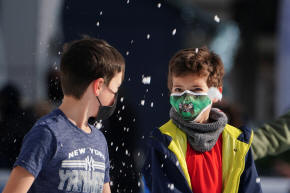Omicron better at invading young noses than other variants; smell loss
may predict memory issues
 Send a link to a friend
Send a link to a friend
 [August 03, 2022]
By Nancy Lapid [August 03, 2022]
By Nancy Lapid
(Reuters) - The following is a summary of
some recent studies on COVID-19. They include research that warrants
further study to corroborate the findings and that has yet to be
certified by peer review.
Childrens' noses defend less well against Omicron
The Omicron variant may be more efficient at infecting children through
the nose than previous versions of the coronavirus, a small study
suggests.
Earlier in the pandemic, children's noses had been less welcoming to the
virus that causes COVID-19 than adults' noses. Studies of the original
SARS-CoV-2 and some of its variants found the virus was met with
stronger immune responses in the cells lining young noses than in
adults' nasal-lining cells, and it was less efficient at making copies
of itself in children's noses.
But recent test-tube experiments mixing
the virus with nasal cells from 23 healthy children and 15 healthy
adults found the antiviral defenses in kids' noses "was markedly less
pronounced in the case of Omicron," researchers reported on Monday in PLOS Biology
https://journals.plos.org/
plosbiology/article?id=10.1371/journal.pbio.3001728. They also report
that Omicron reproduced itself more efficiently in childrens'
nasal-lining cells compared to both Delta and the original virus.

"These data are consistent with the increased number of pediatric
infections observed during the Omicron wave," the researchers wrote,
while calling for additional studies.
Smell problems may predict memory problems after COVID-19
Severity of smell dysfunction after infection with the coronavirus may
be a better predictor of long-term cognitive impairment than overall
severity of COVID-19, according to an Argentinian study.
Researchers studied a random sample of 766 people over age 60, roughly
90% of whom had been infected with the virus. Physical, cognitive and
neuropsychiatric tests performed three-to-six months after infection
showed some degree of memory impairment in two-thirds of the infected
participants. After taking individuals' other risk factors into account,
severity of loss of smell, known as anosmia, "but not clinical status,
significantly (predicted) cognitive impairment," the researchers
reported on Sunday at the Alzheimer's Association International
Conference 2022 https://aaic.alz.org/overview.asp, held online and in
San Diego.
[to top of second column]
|

Children wearing protective masks toss snow at each other as they
skate at Bryant Park during the coronavirus disease (COVID-19)
pandemic in the Manhattan borough of New York City, New York, U.S.,
January 14, 2022. REUTERS/Carlo Allegri
 "The more insight we have into what causes or at least predicts who
will experience the significant long-term cognitive impact of
COVID-19 infection, the better we can track it and begin to develop
methods to prevent it," study leader Gabriela Gonzalez-Aleman of
Pontificia Universidad Catolica Argentina in Buenos Aires said in a
statement.
Vaccine mandates linked to better nursing-home staffing
In U.S. states that mandated COVID-19 vaccines for nursing home
staff, the rules achieved the desired effect and did not lead to
mass resignations and or staffing shortages, a study found.
In states without such mandates, however, nursing
homes did experience staff shortages during the study period,
researchers reported on Friday in JAMA Health Forum
https://jamanetwork.com/
journals/jama-health-forum/fullarticle/2794727. Data collected from
mid-June to mid-November 2021 from the National Healthcare Safety
Network showed that in 12 states with COVID-19 vaccine mandates,
staff vaccination coverage rates ranged from 78.7% to 95.2%. States
without mandates "had consistently lower staff vaccination coverage
throughout the study window" and "higher rates of reported staff
shortages throughout the study period," according to the report.
"The association of mandates with higher vaccination coverage stands
in contrast with prior efforts to increase COVID-19 vaccine uptake
among nursing home staff through education, outreach, and
incentives," the researchers said. They added that the data
"suggests that the fear of massive staffing shortfalls owing to
vaccine mandates may be unfounded."

Click for a Reuters Global COVID-19 Tracker
https://graphics.reuters.com/
world-coronavirus-tracker-and-maps/index.html and for a Reuters
COVID-19 Vaccination Tracker
https://graphics.reuters.com/world-coronavirus-tracker-and-maps/
vaccination-rollout-and-access.
(Reporting Nancy Lapid and Shawana Alleyne-Morris; Editing by Bill
Berkrot)
[© 2022 Thomson Reuters. All rights
reserved.] This material may not be published,
broadcast, rewritten or redistributed.
Thompson Reuters is solely responsible for this content. |